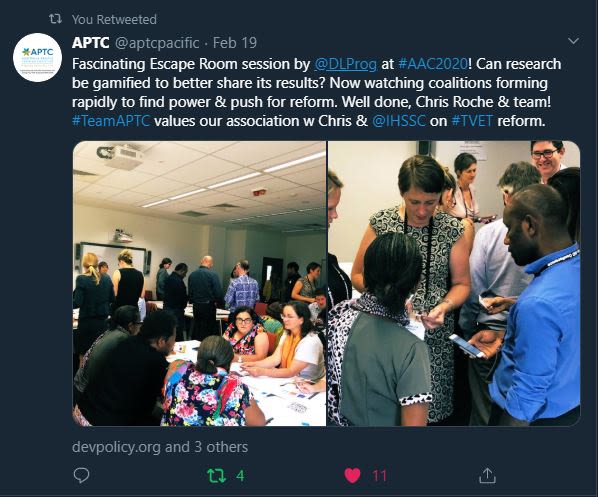Back in June 2019, the DLP team participated in a team-building exercise in Birmingham. Our younger members surprised us by booking an escape room in which we had to escape the Lab and stop mass contamination (prescient or what!).
As we reflected together over a few beers after we had successfully saved the world, we wondered if we could share our research findings in equally engaging ways. And so the idea of a DLP Escape Room was born.
That same night we drafted an abstract for the Australasian Aid Conference 2020 explaining how we wanted to try and ‘gamify’ our research findings, and see if that might engage people in more effective ways than a traditional presentation. Little did we know how much work was involved!
It was with mixed feelings in November 2019 when we heard that the conference organisers had accepted our ‘panel’. And so began our crash course in escape room design.
I don’t want to reveal too much about the content of the escape room as we plan to keep on experimenting with the idea, and we don’t want to spoil the surprise. But suffice it to say we learnt a lot of lessons about trying to engage people in this sort of way, notably:
- There are some amazing resources online to help you design escape room exercises. As our initial shock at having to go ahead with this idea subsided, we turned to Doctor Google with some trepidation. However, we found a wide range of resources often from primary and secondary school teachers about the use of games in general and escape rooms in particular as a means of engaging students in learning exercises;
- Have a practice session with trusted colleagues before going public. We had an invaluable session with the curious Governance Team in DFAT before the event, which helped us hone our ideas and adjust the process in ways that improved the quality of the experience;
- It is an art to get the balance right between fun, puzzles and content. Some people are really happy on day two of a conference not to be confronted by four power-points in a row and there to be ‘no time for questions’ in a 90-minute session. Others are hungry for an in-depth understanding of research methods, approaches and findings. Initially, we focused too much on the fun and puzzles and not enough on the content. The practice session helped us correct this.
- ‘Case in point’ learning is where participants experience and reflect on what is going on in the room in ways which mirror the research findings, which can be extremely powerful, and potentially the most important part of the process.
- Planning an escape room requires a lot of work!
If you are the kind of presenter that writes your slides, or your presentation on the plane, train or in the car on your way to the conference, then think twice about an escape room or gamification process. Here are the areas we considered in the planning phase: the design of puzzles, the estimations of timing, the logistics of working with up to 30 people individually or in groups, the effective integration of content and much, much more are required. Top tip: don’t let people enter an escape room if you haven’t done your homework! - It was fun to run, and feedback was good!
Feedback from participants was generally positive. Participants found the session ‘engaging’ and ‘different’, with some enjoying ‘the confusion which created teamwork’, while others thought the exercise was not ‘quite closely enough linked to the learning’. Overall we feel it was a worthwhile ‘safe-fail’ experiment which we are keen to evolve. Does anyone want to start up a franchise operation for us?

Tweet of images showing the DLP Escape Room in action










